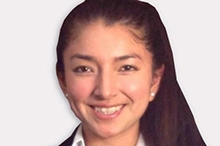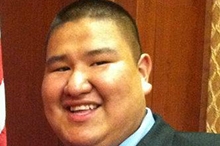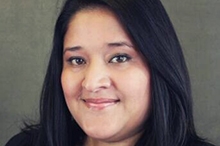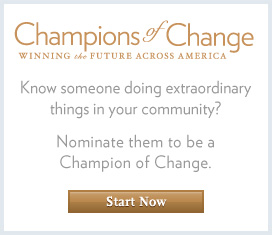Champions of Change Blog
Let’s Tap into Technology to Fill the Gaps in Foster Care
Posted by on May 20, 2015 at 2:03 PM EST
Sixto Cancel is being honored as a Champion of Change for Foster Care
For millions of foster youth in the United States, significant life lessons get lost in transit. Learning to emotionally cope, apply for college, and prepare for the future is difficult when any sense of stability could suddenly collapse.
As Americans, we grow up believing that it is our country given right that if we work hard, we will be able to see a better tomorrow.
However, that was not the case for my older brother who died of gun violence, my sister, who despite engaging in many job trainings, still lost her life to unhealthy choices, or my younger brother, who is incarcerated as a result of stealing food while homeless. Although this does not represent all of my ten siblings, it calls attention to the tragic outcomes of the majority of my siblings who have had interactions with state systems.
The interaction with a system should be an indication that one's life will be better because of the state's involvement, not an indication of negative life outcomes.
I was able to learn how to navigate life by tapping into the supportive adults around me, TV shows like Law and Order, and online resources. However, succeeding required me to overcome the outdated methods of our country’s foster care system, which does not adequately prepare youth for the challenges of aging out, happening for most at 18 or 21 years old. For many youth, leaving the system leads to disillusionment rather than a better life.
Thus, I have made it part of my life’s work to leverage technology, data and multimedia to change the narrative for America’s foster youth. In 2014, I made a commitment through the Clinton Global Initiative University to launch Think of Us, a nonprofit organization that is developing an online space for youth to access content that helps them navigate the world around them. An integral part of our program entails producing interactive videos that coach young people in the foster care system through life challenges large and small on a data driven platform. Through our videos, young people can learn how to do everything from preparing for court to connecting with new biological family members.
It is important to us to use technology to reach today’s foster youth—after all, they are a part of the Millennial generation, a demographic known for its digital nativity and embrace of innovation. Gone are the days of checking encyclopedias or reading manuals to obtain new information. Today, lectures on Algebra and world history are accessible on Kahn Academy with the click of a mouse, and YouTube offers lessons on everything from dating to doing taxes. Likewise, Think of Us is providing a new generation of foster youth with the how-tos that can set them on a trajectory to build confidence, skills, wealth, and a brighter future.
Beyond the interactive coaching videos, Think of Us is also planning to use and develop new technology innovations that have the potential to change the way people learn and engage with digital content. We seek to continue to crowdsource softwares to allow us to innovate our work even further, and collaborate with rising leaders in the technology field to advance progress.
We see technology not as a replacement for the human aspect of developing young people, but as an opportunity to build on what works and to reach Millennials where they are—and that’s online.
I hope our efforts inspire others who serve foster youth to join us in embracing the potential of technology to prepare this vulnerable demographic for the world ahead of them. With a united effort, we can ensure that young people can leave the foster system ready to succeed.
Sixto Cancel is a college student founder of Think of Us, a non-profit dedicated to innovating with data, technology and multi-media to serve vulnerable populations. Sixto is a fourth year student at Virginia Commonwealth University.
Learn more aboutKeeping Faith
Posted by on May 20, 2015 at 1:55 PM EST
Maria Burgos is being honored as a Champion of Change for Foster Care
Growing up in California and studying on the East Coast for the past five years has made me realize my story is unique. School, service, and faith have been my light, even when it appeared that I was navigating a seemingly endless dark tunnel. It is this perspective that I hope to leave as my legacy.
Permanency became a front and center issue when my former foster parents blatantly told me they would not support me with making the down payment on the summer home I was going to sublet. The National Human Genome Research Institute had offered me a paid fellowship and I needed financial assistance to make the first rental payment so I could move to Bethesda, Maryland. Upon turning to my foster parents for help, they gave several reasons as to why they would not help me, including that at my age, they were making payments on their own home with their pooled income. With no other options, I opened a Credit Deposit with all of the small scholarships I had won during my senior year of high school. I had initially set these to mature in four years, but decided to withdraw to be able to pay the first month's rent. It was then that I also signed up for my first and only credit card. Both of these elements made it possible to make it in the Washington, D.C. area until I received my first paycheck.
During my senior year, I began to panic about my post-graduation plans. I did not have a safety net. This was on top of the fact that the prior year, on my 21st birthday, the Chafee Independent Living Services had been discontinued. It became that much tougher to remain calm because buying a good winter coat for all of the blizzards that hit the Northeast, medical treatments for unexpected pneumonia, textbooks, and even laundry would deplete my paychecks.
When I was younger and long-term foster care was the case plan goal for me, I was okay with the court’s decision. It was not until faced with my post-graduation transition that I realized a more solid foundation would have prevented a lot of panic attacks and bouts of anxiety.
I do not wish for another young adult to go through their college years choosing between paying for an asthma inhaler and getting a much-needed long-sleeve t-shirt. This is why I completely support President Obama’s efforts to allocate more funds to prevention services, to eliminate long-term foster care as case plan goal for teens, and to propose extending the Chafee Independent Living Services grant to age 22 when most students are seniors in college. This is less expensive than funding prisons or ongoing welfare support for unemployed adults.
Because of the experienced hardships that come from aging out of the system and because medicine is a respected part of the social structure, I plan to channel my energies and talents to capitalize on this platform to help educate stakeholders and legislators about the detrimental effects of foster care and poverty. This is why I want to be a pediatrician and part-time social worker. I wish help combat these educational and health effects by influencing policymakers to level the playing field and referring my patients to the educational, nutritional, legal, housing, and transportation services they require to ensure the best possible health and relationships. My medical expertise could then be shared with decision-makers to help improve the outcomes and the overall health and safety standards for minorities, foster youth, incarcerated populations, and the undocumented. I would also write articles on these intersections in order to assist in raising awareness on the distinct experiences faced by these populations.
I have the motivation to give my 110 percent and capitalize on various opportunities that can help me become the greatest public service servant I can be.
Maria Burgos is graduating from college in a few short days. She is a senior at Brown University.
Learn more aboutCreating Supportive Networks for Future Generations of Foster Youth
Posted by on May 20, 2015 at 1:42 PM EST
Chelsea Faver is being honored as a Champion of Change for Foster Care
Removal from home, no matter the length of time, can be a traumatic experience for any child or youth. Relationships are broken, families can become permanently torn apart, and it can feel like every piece of normalcy is completely ripped away. Fortunately, foster care can also bring many positive opportunities. My time in care afforded me the opportunity to take control of my life. I was placed in a group home with supportive staff who motivated me to finish high school early and begin college. After transitioning from care, I graduated from Indiana University, fulfilled a lifelong dream of becoming a Marine, and began law school.
While I did encounter many obstacles that youth around the country face as they enter into and transition out of care, the supportive network I gained through Indiana’s child welfare system pushed me over each and every hurdle I faced, both while in care and even long after care. I was extremely fortunate to find this strong network of support, but many youth do not have this same experience. While in care, I witnessed the struggles of many of my peers who were not able to overcome the overwhelming odds facing foster youth. These experiences are what motivated me to use my voice to advocate for youth currently and formerly in foster care and play an active role in the national dialogue on improving outcomes for what is often a forgotten population.
As a nation, we have made great strides in identifying best policies and practices for our youth. Permanency, a word I never heard while in care, is becoming a high priority. There has been an exciting emphasis placed on finding permanent connections for each and every youth who enters into the child welfare system. Additionally, many states have been implementing extended foster care which, among many things, helps youth maintain stability as they emerge as a young adult pursuing higher education or entering the workforce. The National Youth in Transition Database is now collecting data on our young people as they transition into adulthood and is providing a new way to better understand the services provided to youth and how they are really doing in response to these services. These are just a few of some of the exciting results and initiatives that can happen when we focus on the overall well-being and support of one of our most vulnerable populations.
The success and well-being of our youth hinge on much more than physical safety. My hope is that every state will continue developing cutting edge, innovative services meant to support youth currently and formerly in care. Additionally, supportive infrastructures for our youth can be created through cross system collaboration in partnership with authentic youth voice and engagement, giving every child that comes in contact with the child welfare or juvenile justice systems a better chance for success. Infrastructures built through collaboration between systems, agencies, and even states are key to ensuring that every child in the system takes foster care to the next level and allow all of us to invest in our youth through time, support, understanding, and advocacy. Now is the time to make sure that each and every child in the system has equal access to these supportive services.
Chelsea Faver currently serves as a Second Lieutenant in the United States Marine Corps while also pursuing her Juris Doctor. She is a graduate of Indiana University and a student at Indiana University’s McKinney School of Law.
Learn more aboutLeave No Indian Child Behind
Posted by on May 20, 2015 at 1:17 PM EST
Daryle Conquering Bear Crow is being honored as a Champion of Change for Foster Care
Understanding your identity is important for any young person, whether or not they are in foster care. Culture is a big part of an individual’s development and identity. Although these issues of identity and culture are important for every child and foster child’s development, they are, perhaps, even more so for native foster youth. Native youth who are not in care and are connected to their tribe have opportunities to attend sweat lodges, vision quest, and various other native rites of passage that are important to the native culture. Many Native American youth in foster care do not get to experience these milestones in native life and lack a connection to their culture and identity as a result. The development of self-esteem as a Native American is critical for young people. Without cultural connections, native youth may suffer from low self-esteem. And if they return to their reservation after care, they can feel like a spectator, because they do not know how to participate in activities with the community, such as dances at pow-wows.
A sense of purpose is also important to the Native culture. In Native ways, the Creator has put us all here for a purpose and that purpose in life comes through milestones in a young Native person’s life. Native foster youth in non-native care do not get the opportunity to connect with the Creator during these Native ceremonies and events and they may struggle to find a sense of purpose as to why they were put here on earth.
My work over the last 10 years has geared to helping states understand why we need full compliance of the Indian Child Welfare Act. ICWA states, “It is the policy of this Nation to protect the best interests of Indian children and promote the stability and security of Indian Tribes and families” and “reflect the unique values of Indian culture.” The best interests of the Native American child include an understanding of his or her identity and connection to his or her culture as a native youth. Currently, however, ICWA is failing to provide this expressed best interest of every native child in care. Too many Native youth are not connected to their culture while in foster care and, as a result, many native youth exit out of care with unanswered questions about their identity.
I have had the opportunity to collaborate with national Native American organizations to speak out on youth development and the identity of our youth in care, the importance of cultural connections. My two most memorable internships included the summer of 2012 when I interned for United States Senator Tim Johnson (D-South Dakota). It was this summer that I was able to really sit down and talk to congressional members about the importance of ICWA and the identity of native children in foster care. I wrote a congressional report and presented it to numerous congressional members at the end of my internship. Following the summer of 2012, I interned for the National Indian Child Welfare Association, with the Government Policy department. There, I was able to fully dive into ICWA, work with numerous staff, tribal elected officials, and present the importance of ICWA. I believe the internship with NICWA has developed my professional career and love for youth development and identity.
The importance of keeping connected to culture and identity is important for any children and youth in care. My work will always continue to help the future generations of native youth. Decisions we make today impact the generations after us. Leave No Indian Child Behind; they all deserve a chance.
Daryle Conquering Bear Crow is the Healthy Living Program Assistant at the Denver Indian Family Resource Center. He is a senior at Oregon State University.
Learn more aboutPositive Outcomes
Posted by on May 20, 2015 at 1:10 PM EST
Lupe Ortiz-Tovar is being honored as a Champion of Change for Foster Care
In my nearly 10 years working in the field, I’ve learned a tremendous amount from my younger and older peers from foster care and child welfare professionals. I’ve experienced and witnessed the positives of systems collaboration, how empowering youth will build them up to take a lead role in navigating their life and that networks of supports are key to increasing positive outcomes for youth in and from foster care.
Social workers, teachers, counselors, mentors and others involved in my journey connected me with resources, opportunities and normative activities that equipped me with skills needed for life after foster care, I aged-out without a permanent family at the time. At age 16 my social work asked me “What do you want to do when you graduate high school?” I didn’t know either of those milestones was attainable for me. This one question however, gifted me with forethought, beyond the statistics I knew of about “kids in foster care,” barely making it by and not graduating. She sparked something in me that could never be taken away, my voice.
I graduated from high school with my class and from Arizona State University (ASU) (Go Sun Devils!). Many resources have supported my journey. I was awarded a Continuing Job Training and Education Training (CJET) scholarship from Casey Family Programs and the state of Arizona. All states also have the Education Training Voucher for youth who voluntarily sign up to stay in foster care to receive those supports. Another bonus—I was awarded a work study grant from ASU. These resources provided me with the minimums I needed to complete my education: a roof over my head (especially during holiday breaks and summertime), steady supplemental income with the option for flexible work hours so I could focus on studying, and the assurance of my education being paid for. Another perk was getting involved in clubs on campus and after graduation I gained a network of sisters through my sorority, Theta Nu Xi Multicultural Sorority Inc. Without these resources, reconnecting with my little biological little sister, and networks of supports, I would not have graduated.
Life after foster care and in college has taught me the importance of cultivating positive networks of supports. A big challenge in foster care is the loss of relationships—with every move and staff change that youth experience, efforts must be made to surround young people with stability and opportunities to connect with positive peers and potential mentors and permanent connections. Two of my supports made a difference in my life by sharing national internship and volunteer opportunities with me from Foster Care Alumni of America and FosterClub. I learned through these opportunities that the pain and hurt carried deep inside can spark inspiration and even impact legislative change for the nation. But first, I had to learn what I was okay with sharing while protecting myself, protecting those who are part of my story and those who may listen or hear my story.
I thank my family (I was adopted by my Dads at age 32), mentors, sorority sisters, and life-long friends for being the examples I treasure and need to continue move forward in my path in life. Because of many believing in me, investing in me and empowering me to believe in myself, I am a positive outcome. Every youth from foster care deserves this.
Lupe Tovar is a Project Coordinator at JBS International Inc., and a Foster Care Alumni of America- Board of Director Member. She is a graduate of Arizona State University.
Learn more aboutMore than Equality, We Need Equity
Posted by on May 20, 2015 at 12:52 PM EST
George White is being honored as a Champion of Change for Foster Care
Leadership is about being a person who not only models change, but also being someone who is willing to get down in the trenches and do the hard work, ask the difficult questions, and challenge the status quo. Growing up, I was surrounded by people who made it their mission to serve others and affect change, including a loving foster family, who opened up their home to give me a fighting chance.
However, I see every day the effects the foster system has on kids, parents, families and entire communities. Too often, foster children are traumatized, marginalized, stigmatized, oppressed and forgotten. If we don’t fight for our children who will? To quote Ralph Ellison:
I am invisible. Misunderstood, simply because people refuse to see me. Like the bodiless heads you see sometimes in circus sideshows, it is as though I have been surrounded by mirrors of hard, distorting glass. When they approach me they see only my surroundings, themselves, or fragments of their imagination—indeed, everything and anything except me (Ellison, 1952).
In the preceding excerpt from Ralph Ellison’s 1952 novel, Invisible Man, he conceptualizes how a large society can minimize the individual. Ellison did not proclaim this invisibility, it was created by a society that refuses to accept the validity of his existence. Although Ellison was referring to the experience of the Black American, I can relate more to his sentiments as a young man who was raised in foster care.
My invisibility confronted me vigorously—it was at home, in classrooms, and recreational spaces. However, my resilience helped me reach for greatness and discover my limitless potential. It was through these experiences that I realized all foster youth, when given the opportunity, have an unbelievable ability to achieve success. Foster youth, have more grit, character, tenacity and resilience than any other marginalized population I know.
This newfound awareness became increasingly important when my older brother turned 18 and was forced out of his foster home. He was doing everything right, yet, he was living on the street simply because the child welfare system said he was too old. I could not idly watch this injustice from the sidelines.
My brother’s journey became my rallying cry and call to action. With the help of Peace4Kids and the community I had built, I launched a campaign called “All I did was turn 18.” We took pictures where foster youth slept after being “kicked out” of the system and I rode my bike 1,149 miles in honor of all the foster youth who were expected become homeless that year in California.
This has led to my work with Fostering Change to clearly define the unique asset and skills that foster youth poses. In addition, I serve as the Program Assistant for the National Foster Youth Institute, where I work with a brilliant team to improve career and educational outcomes for current and former foster youth.
Webster’s Dictionary defines a champion as someone who fights or speaks publicly in support of a person, belief, or cause. Webster’s goes on to define change as making someone or something different. With that, I am truly humbled to be recognized as a Foster Care Champion of Change as I fight to make the foster care system a better experience.
George White serves as the Program Assistant at the National Foster Youth Institute as well as a Founding Member of Fostering Change, a program of Peace4Kids, in Los Angeles, California. George is a graduate of Southern New Hampshire University.
Learn more about
- &lsaquo previous
- …
- 2
- 3
- 4
- 5
- 6
- 7
- 8
- 9
- 10
- …
- next &rsaquo

